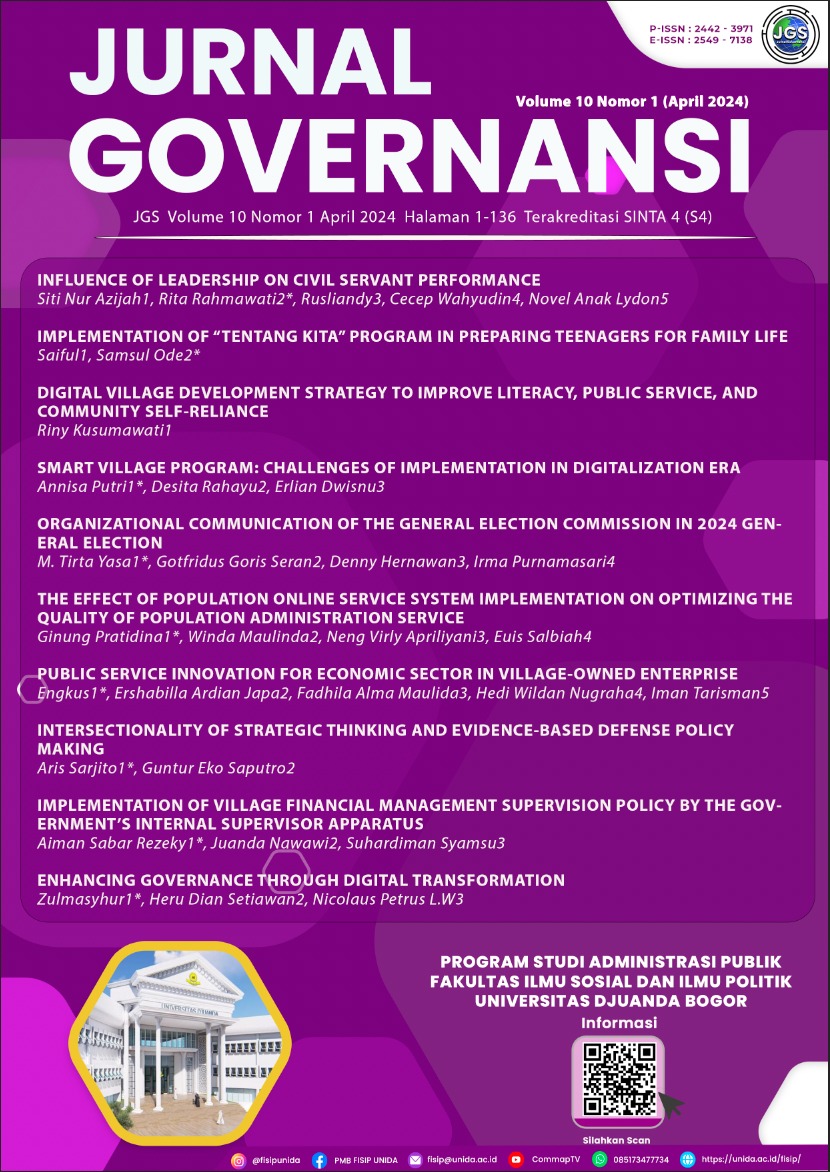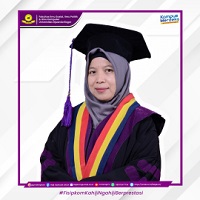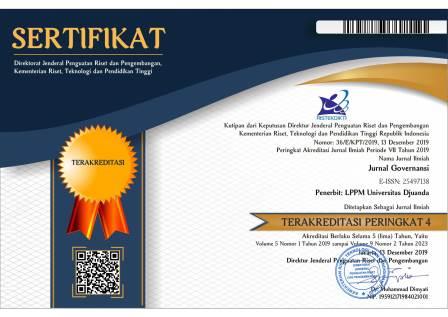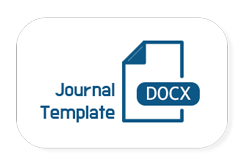SMART VILLAGE PROGRAM: CHALLENGES OF IMPLEMENTATION IN DIGITALIZATION ERA
DOI:
https://doi.org/10.30997/jgs.v10i1.11565Keywords:
Digitalization, Program Implementation, Smart VillageAbstract
The government targets 3000 villages to be included in the smart village program in 2024. Smart villages can support the management of existing resources and potential. Nakau village is one of villages implementing the smart village program. The village has characteristics of diverse community and different cultures, so that the implementation model must be different. Therefore, identifying factors that support the smart village program is essential. This research aims to identify the factors that influence the implementation of smart village program in Nakau village. Goggin's theory is a tool for observing the five elements, namely the series of decisions, the content of decisions and the form of decisions, constraints at the regional level, regional decisions and capacity, and feedback. This is a qualitative descriptive study; the analysis unit consists of all stakeholders involved in this program, including the village's officers, the community, digital ambassadors and cadres, the government, and other parties. Informants are drawn by purposive sampling. Data are collected by observation, documentation studies, and interviews. Data are interactively analyzed. The smart village program in Nakau village has been implemented. Several activities are already underway. However, a process is needed for the program to be perfectly implemented. The factors that influence the implementation of the smart village program in Nakau village are related to the problem of time and budget. For the program, it is a relatively new implementation, so that the stakeholders need time to implement the program and the implementation budget disbursement.
References
Andari, R. N., & Ella, S. (2019). Pengembangan Model Smart Rural untuk Pembangunan Kawasan Perdesaan di Indonesia. Jurnal Borneo Administrator, 15(1), 41–58. https://doi.org/https://doi.org/10.24258/jba.v15i1.394
Aslinda. (2023). MODEL KEBIJKAN PUBLIK DAN TEORI KEBIJAKAN (1i ed.).
Bosworth, G., Whalley, J., Fuzi, A., Merrell, I., Chapman, P., & Russell, E. (2023). Rural co-working: New network spaces and new opportunities for a smart countryside. Journal of Rural Studies, 97(January), 550–559. https://doi.org/10.1016/j.jrurstud.2023.01.003
Budianta, M. (2019). Smart kampung: doing cultural studies in the Global South. Communication and Critical/ Cultural Studies, 16(3), 241–256. https://doi. org/10.1080/14791420.2019.1650194
Creswell, J. W. (2014). Research and mixed method approaches. In Research in Social Science: Interdisciplinary Perspectives (fourth, Issue September). SAGE. https://books. google.com/books/about/Research_Design.html?id=nSVxmN2KWeYC%0Afile:///E:/Documents/dosen/buku Metodologi/[John_W._Creswell]Research_Design_Qualitative,_Q(Bookos.org).pdf
Dunn, W. N. (2003). Pengantar Analisis Kebijakan Pulblik. In Gadjah Mada Universitas Press (kedua). Gadjah Mada University Press. https://www. pdfdrive.com/pengantar-analisis-kebijakan-pulblik-e176089208.html
Dwiyanto, I. (2017). KEBIJAKAN PUBLIK BERBASIS DYNAMIC POLICY ANALYSIS. Gava Media.
Hasibuan, M., Sutedi, Lestari, S., Chairan, & Wasilah. (2021). Framework Pemba-ngunan Smart Village Indonesia (Svi). Prosiding Seminar Nasional Aplikasi Sains & Teknologi (SNAST), 142–145.
Herdiana, D. (2019). Pengembangan Konsep Smart Village Bagi Desa-Desa di Indonesia (Developing the Smart Village Concept for Indonesian Villages). JURNAL IPTEKKOM: Jurnal Ilmu Pengetahuan & Teknologi Informasi, 21(1), 1. https://doi.org/ 10.33164/iptekkom.21.1.2019.1-16
Hill, M., & Hupe, P. (2002). Implementing Public Policy: Governance in Theory and in Practice Michael. In Handbook of Public Policy Analysis: Theory, Politics, and Methods. SAGR. https://doi.org/10.4324/9781315093192-14
Indiahono, D. (2021). Bureaucratic Reform by Building Trust in Citizens: Best Practices from Local Online Complaints. Policy & Governance Review, 5(2), 146. https://doi.org/ 10.30589/pgr.v5i2.347
Kapoor, N., Ahmad, N., Nayak, S. K., Singh, S. P., Ilavarasan, P. V., & Ramamoorthy, P. (2021). Identifying infrastructural gap areas for smart and sustainable tribal village development: A data science approach from India. International Journal of Information Management Data Insights, 1(2), 100041. https://doi.org/10.1016/j.jjimei.2021.100041
Kasinathan, P., Pugazhendhi, R., Elavarasan, R. M., Ramachandaramurthy, V. K., Ramanathan, V., Subramanian, S., Kumar, S., Nandhagopal, K., Raghavan, R. R. V., Rangasamy, S., Devendiran, R., & Alsharif, M. H. (2022). Realization of Sustainable Development Goals with Disruptive Technologies by Integra-ting Industry 5.0, Society 5.0, Smart Cities and Villages. Sustainability (Switzerland), 14(22). https://doi.org /10.3390/su142215258
Lubis, F., & Yusniah. (2022). KONSEP IMPLEMENTASI SMART VILLAGE (R. R. Rerung (ed.)). Media Sains Indonesia.
Martadala, D. A., Susanto, E. R., & Ahmad, I. (2021). Model Desa Cerdas Dalam Pelayanan Administrasi (Studi Kasus: Desa Kotabaru Barat Kecamatan Martapura Kabupaten Oku Timur). Jurnal Teknologi Dan Sistem Informasi (JTSI), 2(2), 40–51. http://jim. teknokrat.ac.id/index.php/JTSI
Miles, M. B., & Huberman, A. M. (1994). Qualitative data analysis: An expanded sourcebook. Thousand Oaks: Sage Publication. SAGE Publications.
Muazir, S., Lestari, L., Alhamdani, M. R., & Nurhamsyah, M. (2020). Menuju Desa Cerdas Perbatasan: Survey Kesiapan Desa Cerdas. Jurnal Pembangunan Wilayah & Kota, 16(2), 120–135. https://doi.org/https://doi.org/10.14710/pwk.v16i2.27417
Pranata, A., Rahayu, D., & Yahya, R. (2023). Dilema pengelolaan dana desa masa pandemi covid 19. 2(2), 125–134. http://159.223.71.124/index.php/jsb/article/view/108/144
Prasetyo, E., M. Mazya, T., & Nurimani, N. (2023). Penerapan Model Tata Kelola Digital Pada Pelayanan Publik Daring. Jurnal Governansi, 9(2), 81–94. https://doi.org/10.30997/jgs.v9i2.7448
Pusat Kajian Desentralisasi dan Otonomi Daerah Lembaga Administrasi Negara. (2019). Laporan Isu Strategis Pengembangan Model Cerdas (Vol. 53, Issue 9). https://ppid.lan.go.id/wp-content/uploads/2019/08/PKDOD-Pengembangan-Desa-Cerdas-Rilis-20122018.pdf
Rahayu, D., Agus, N. F., & Rindawati, S. (2023). Peranan Multistakeholder dalam Mewujudkan Desa Cerdas Di Desa Harapan Kabupaten Bengkulu Tengah. Jurnal Pengabdian Pasca Unisti (JURDIANPASTI), 1(2), 123–138. https://ejournal.pps-unisti.ac.id/index.php/jurdianpasti/article/view/166/142
Rahayu, D., Supawanhar, & Akmal, S. (2023). Optimalisasi cerdas tata kelola pariwisata berkelanjutan desa harapan. Semarak Mengabdi, 2(2), 45–52. http://159.223.71.124/index.php /jsm/article/view/101/126
Rahmawati, D., Sulistyarso, H., Ariastita, P. G., Yusuf, M., & Paramasatya, D. A. (2018). Smart kampung for Surabaya smart city: Criteria redefined. IOP Conference Series: Earth and Environmental Science, 202(1). https://doi.org/10.1088/1755-1315/202/1/012068
Redjo, S. I. (2019). PEMERINTAHAN YANG CERDAS YANG DIBUTUHKAN DALAM REVOLUSI INDUSTRI 4.O. Jurnal Ilmu Politik Dan Komunikasi, IX(1), 1–7. https://ojs.unikom.ac.id/index.php/jipsi/article/view/2291
Salmaa. (2023). Metode Penelitian Kualitatif: Definisi, Jenis, Karakteristiknya. Deepublish.
Sugiyono. (2022). Metode Penelitian Manajemen (Setiyawarmi (ed.); 2nd ed.). Alfabeta.
Weible, C. M., & Sabatier, P. A. (2018). THEORIES OF POLICY PROCESS (fourth, Vol. 01). Taylor & Francis All.
Downloads
Published
How to Cite
Issue
Section
License
Copyright (c) 2024 Annisa Putri, Desita Rahayu, Erlian Dwisnu

This work is licensed under a Creative Commons Attribution-ShareAlike 4.0 International License.
Authors who publish with Jurnal Governansi agree to the following terms:
- Authors retain copyright and grant the journal right of first publication with the work simultaneously licensed under a Creative Commons Attribution 4.0 International License that allows others to share the work with an acknowledgement of the work's authorship and initial publication in Jurnal Governansi.
- Authors are able to enter into separate, additional contractual arrangements for the non-exclusive distribution of the journal's published version of the work (e.g., post it to an institutional repository or publish it in a book), with an acknowledgement of its initial publication in Jurnal Governansi.
- Authors are permitted and encouraged to post their work online (e.g., in institutional repositories or on their website) prior to and during the submission process, as it can lead to productive exchanges, as well as earlier and greater citation of published work.



















